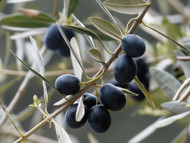The Medicinal Benefits of Olives, Olive Oil and Olive Leaves
Posted by Zebra Organics on 2019 Feb 6th
Olive trees have been under human cultivation for thousands of years. And some of the trees are amazingly old, with one olive tree near Bethlehem dated to between 1000 and 3500 B.C. (Ruffin 2020). Native to the Mediterranean, olives, olive oil and olive leaves have been used in food and medicine for thousands of years. They also carry strong symbolism, with olive branches being considered a sign of peace. All three of the main products from olive trees used in food and medicine appear to have intriguing health benefits, initially supported in studies on the Mediterranean diet.
Trying to identify diets that support overall health and wellbeing has been challenging doctors and the research community for many years. Yet, the Mediterranean diet, with olives and olive oil being core staples, has provided some of the strongest evidence for supporting and improving general health. The Mediterranean diet appears to help reduce risks of cancer, heart disease, diabetes, Alzheimer's disease, autoimmune conditions, stroke and mental health (Ventriglio 2020, Machowicz 2020, Salliot 2020, Papadaki 2020). If the Mediterranean diet was a pill, it would be recommended as a preventative tool for the vast majority of patients.
The Health Benefits of Olives, Olive Leaves and Olive Oil
Olives have been used as food since before Biblical times with some estimates that olive trees were under cultivation before the development of written language. As food, olives have a number of unique characteristics. They are high in antioxidants that appear to provide at least some of their health benefits (Boskou 2005). These antioxidants contribute to the taste and stability of olive oil (Dagdelen 2013). They are also found in olive leaves, potentially adding to their medicinal effects (Talhaoui 2015).
Olive products appear to have broad-reaching health benefits, including:
- Reducing heart disease
- Protecting bone health
- Antimicrobial benefits (viral, fungal and bacterial)
Olive Products and Heart Disease
The Mediterranean diet has been shown to reduce the risk of heart disease by 23% in elderly individuals (Dontas 2007). Part of this benefit may be mediated through cholesterol. LDL cholesterol is generally considered the “bad” cholesterol that contributes to heart disease. However, in order for LDL to become a problem, it has to be damaged, or “oxidized”. Compounds found in olives, olive oil and olive leaves appear to block this process, binding to LDL and preventing oxidative damage (Covas 2006). Clinically, this likely helps slow the buildup of plaque in the walls of blood vessels, a major contributing factor to heart disease.
Further evidence on olive compounds shows potential benefits on blood pressure (Torre 2020). In a clinical trial, olive leaf extract was as effective as medication for lowering high blood pressure (Susalit 2011). At least part of this benefit comes from the anti-inflammatory constituents found in olives and olive products (Javadi 2019). Additional clinical trials have confirmed the findings, some even showing benefits for lowering cholesterol levels as well (Lockyer 2016).
Olive Products and Bone Health
Preclinical studies have been suggesting the compounds found in olive products have beneficial effects on bone health. In a rat model of osteoporosis, olives were able to prevent bone loss (Puel 2007). Mouse studies have shown similar benefits using phenolic compounds found in olives and olive leaves (Hagiwara 2011).
In a human trial, one year of supplementing with an olive extract showed improved markers of bone health and stabilization of bone density. In comparison, the control group had increased bone loss over the course of the study (Filip 2015).
Olive Compounds as Antimicrobials
Research on antimicrobial compounds is ongoing especially since numerous bacteria are developing resistance to antibiotics. Phenolic compounds found in olive extracts appear to have the potential as antimicrobial agents for a number of different applications.
A recent study found the promising antifungal activity of olive leaf extracts (Muzzalupo 2020). Olive leaf extract was also shown to have some promise for use against the Herpes virus (Altindis 2020). In addition, leaf extracts appear to have activity against pathogenic bacteria (Borges 2020). Even olive oil appears to retain antibacterial effects (Nazzaro 2019).
While we still need evidence from clinical trials to evaluate benefits in humans, different types of olive extracts may hold some promise for helping in treating certain types of infectious conditions.
Conclusion
Olive trees have been under cultivation by humans for thousands of years. They have been revered for food and medicine since ancient times. Some of the latest research is suggesting interesting benefits from the consumption of products based on olive fruits and leaves. With the multitude of benefits seen with the Mediterranean diet, it’s well worth considering including olives and olive oil for their potential benefits.
About Dr. Scott Buesing
Dr. Scott is a practicing naturopathic doctor in Palm Desert, California with a background in research and clinical practice working with patients in person or through telemedicine in California and Washington state. As an expert in integrative medicine, he offers research services summarizing the latest published information on medical topics. In addition, Dr. Scott writes a weekly blog available on his website: buesingnaturopathic.com/blog

